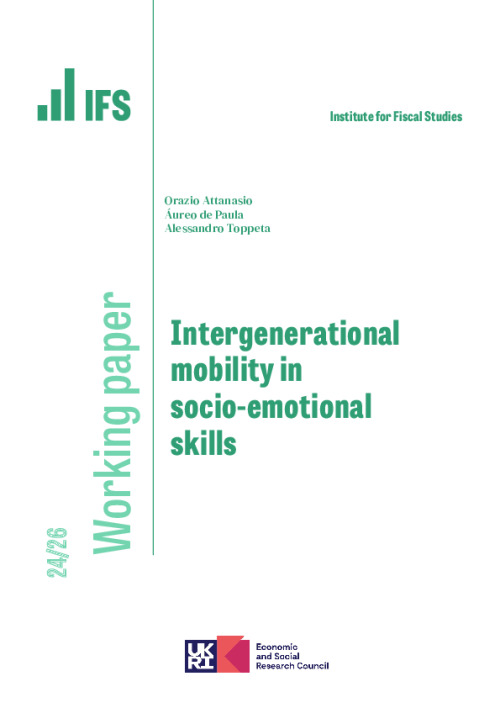Downloads

Download working paper here
PDF | 2.63 MB
This paper investigates the intergenerational transmission of socio-emotional skills during childhood, using data from the 1970 British Cohort Study (BCS70) in the United Kingdom. This dataset enables us to measure two dimensions of socio-emotional development: internalising and externalising skills. More importantly, we can use multiple measures of parents’ skills collected during both their childhood and their adulthood. Whereas parent-child skills are strongly related when both are measured contemporaneously, they remain correlated when both are measured in childhood, with a stronger transmission observed from mothers to their children. Additionally, by leveraging the BCS70 data on socio-emotional skills for three generations, we estimate multi-generational persistence. Notably, we find a correlation between the grandmother’s internalising skill and the grandchildren’s skills, even after accounting for parental skills.
Authors

Research Fellow
Orazio is an International Research Fellow at the IFS, a Professor at Yale and a Research Associate at the National Bureau of Economic Research.

Research Fellow University College London
Áureo is an applied econometrician with strong interests in both methodological and empirical questions, affiliated with UCL, Cemmap, IFS and CEPR.

Assistant Professor of Economics SOFI, Stockholm University
Working Paper details
- DOI
- 10.1920/wp.ifs.2024.2624
- Publisher
- Institute for Fiscal Studies
Suggested citation
Datasets used
More from IFS
Understand this issue

Sure Start achieved its aims, then we threw it away
15 April 2024

Why inheritance tax should be reformed
18 January 2024

Social mobility and wealth
12 December 2023
Policy analysis

Homeownership for young adults has recovered to its 2010 level
29 May 2024

The short- and medium-term impacts of Sure Start on educational outcomes
9 April 2024

Sure Start greatly improved disadvantaged children’s GCSE results
9 April 2024
Academic research

The intergenerational elasticity of earnings: Exploring the mechanisms
3 June 2024

Economics of Childhood Nutrition Workshop

Forced displacement, mental health, and child development: Evidence from Rohingya refugees
10 May 2024